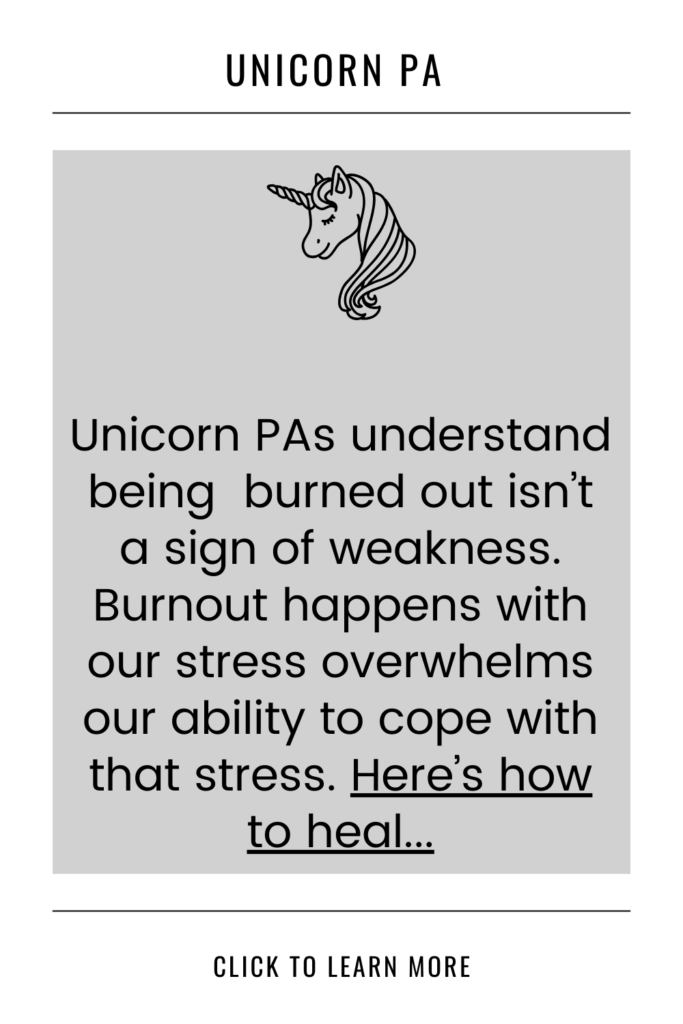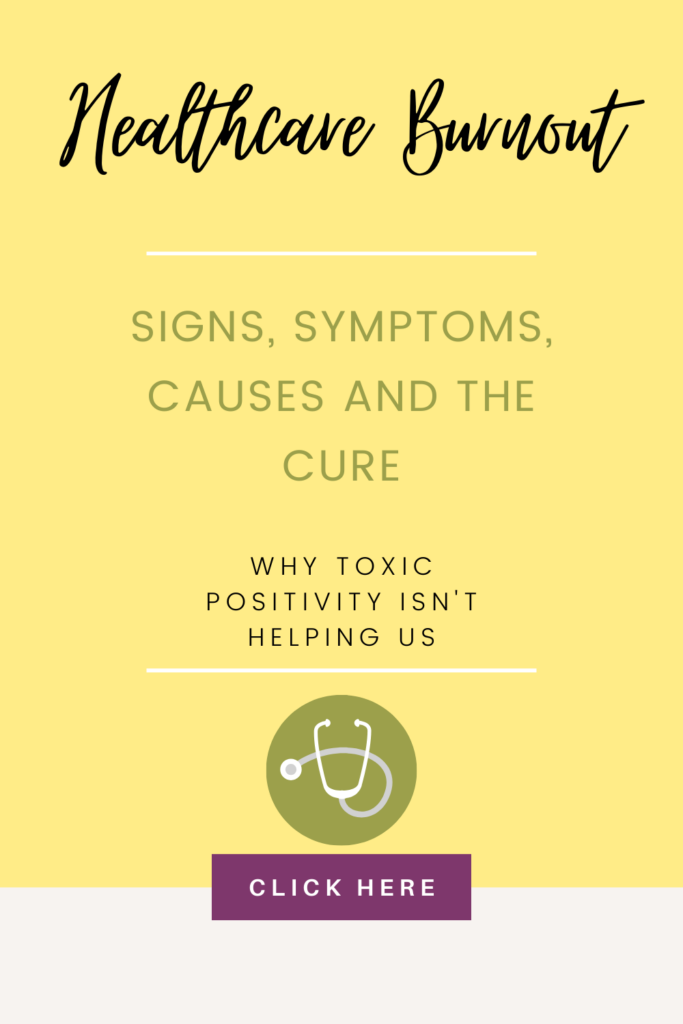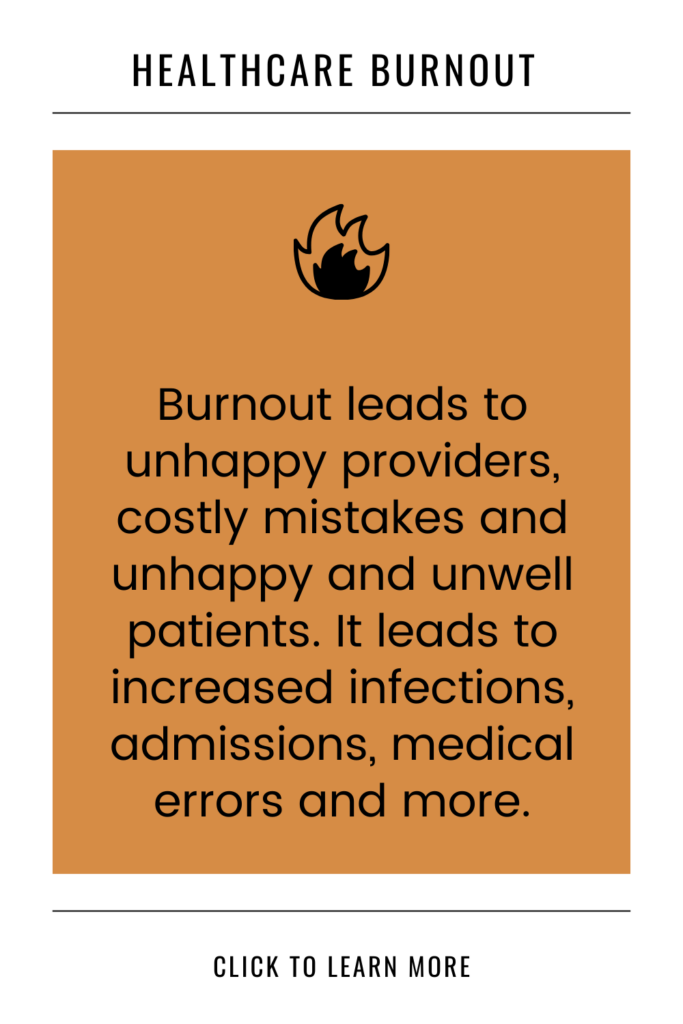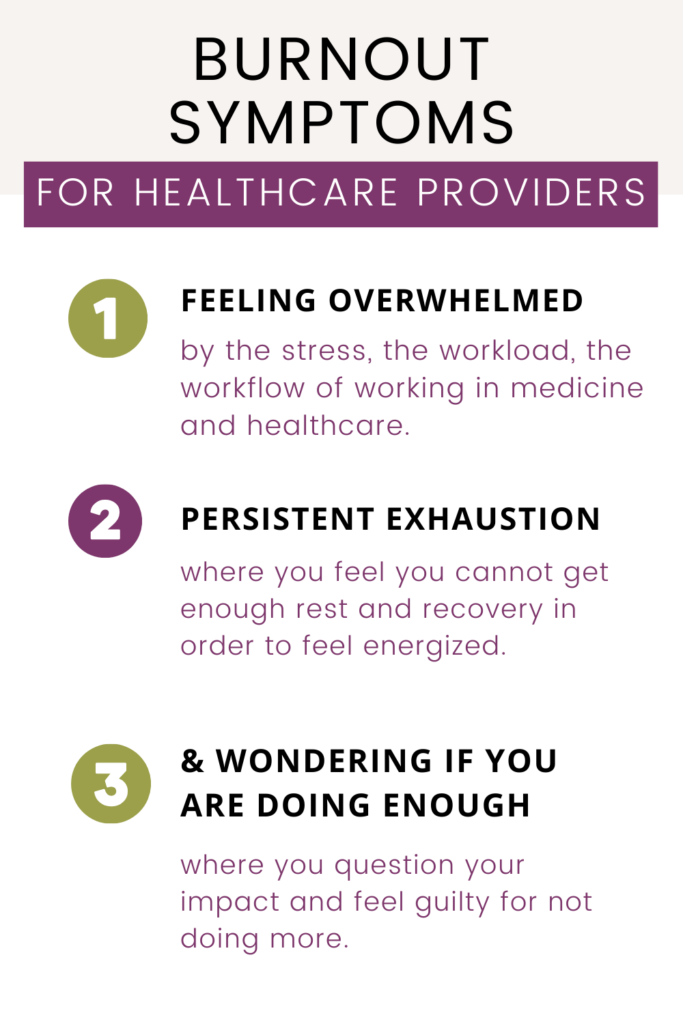Healthcare Burnout
Have you ever felt so emotionally, mentally and downright physically exhausted that you couldn’t keep going? This state, caused by prolonged or excessive stress that overwhelms your ability to cope, is called burnout.
In 2020 in the midst of working inpatient Urology during the COVID-19 pandemic, I hit absolute rock bottom personally and professionally. I wasn’t the mom, wife, PA or human being I wanted to be. I was embarrassed at the way that I was showing up in the world. I was a shell of the former Tracy and I couldn’t keep going like that.
During that season I was mentally, physically and spiritually exhausted… I was also profoundly sick with tachycardia, insomnia, pneumonia and autoimmune hyperthyroidism. Anxious, depressed, shaky, and exhausted, I was never able to get enough sleep. In summary; I was burned out. Burnt to a crisp, really.
APPLE PODCASTS | SPOTIFY| YOUTUBE
Watch on YouTube Here

Burnout as a Turning Point
My life is largely defined as BB and AB – before burnout and after burnout. Burnout caused me to quit my job, change the trajectory of my career and served as the catalyst for this show and sharing of my story with you.
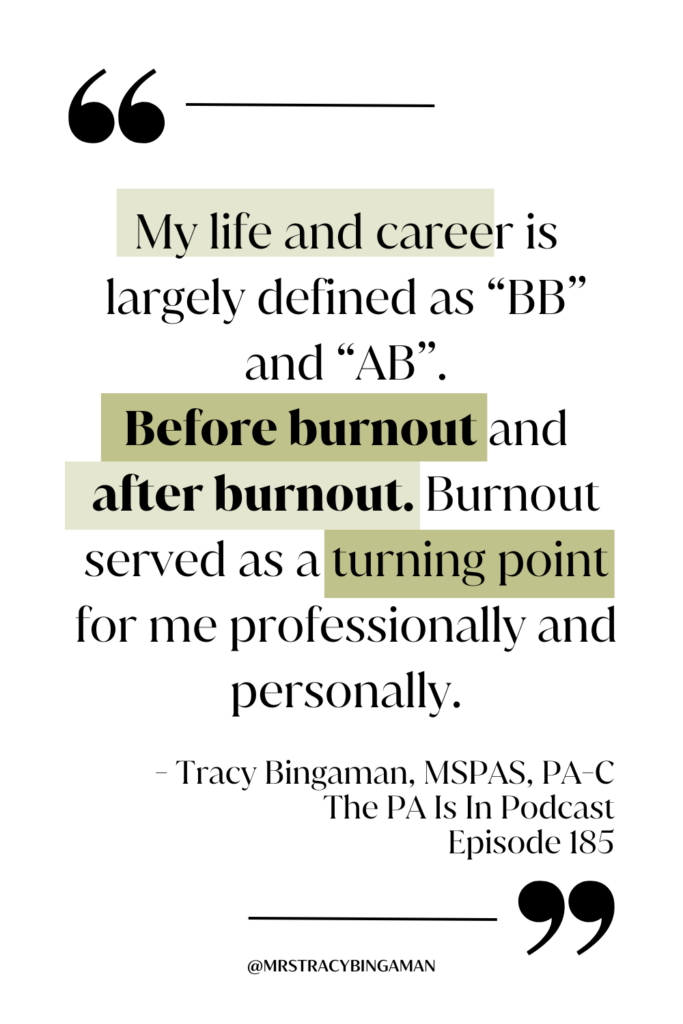
At the time I was desperate for resources on burnout, specifically for PAs like me. I went in search of resources for people juggling ICU patients, clamping renal arteries for partial nephrectomies and triaging testicular torsions, and also coordinating ballet classes, soccer practice and daycare drop off for my 5 kids. So I started searching the internet.
Google failed me for the first time ever. There was a profound lack of resources for burned out PAslike me. So, I created them. I’ve spent the last two and a half years building the resources and support I wished I had found during the depths of my burnout.
What to Expect
Here’s what you can expect to hear on this episode – Burnout 101 – I’ll share the triad of burnout symptoms and some important stats about the prevalence of burnout in healthcare.
I’ll review the effects of burnout on the individual and the healthcare system at large. As if burnout were a disease, we will review the pathophysiology and I’ll share the cure. We will focus on what you can do as an individual to recover from or prevent burnout: specifically building boundaries and creating sustainable self-care practices.
Triad of Burnout
In medicine we love a good triad, so let’s review the three factors that go into healthcare burnout.
In layman’s terms, Dr. Amelia Nagoski defines burnout as a triad of: 1 – Feeling overwhelmed, 2 – Emotionally exhausted, and 3 – Still wondering if you are doing enough.
If you want to stay more clinical, the burnout triad as defined by Dr. Christina Maslach is 1 – Decreased sense of personal accomplishment, 2 – Depersonalization, and 3 – Emotional exhaustion.
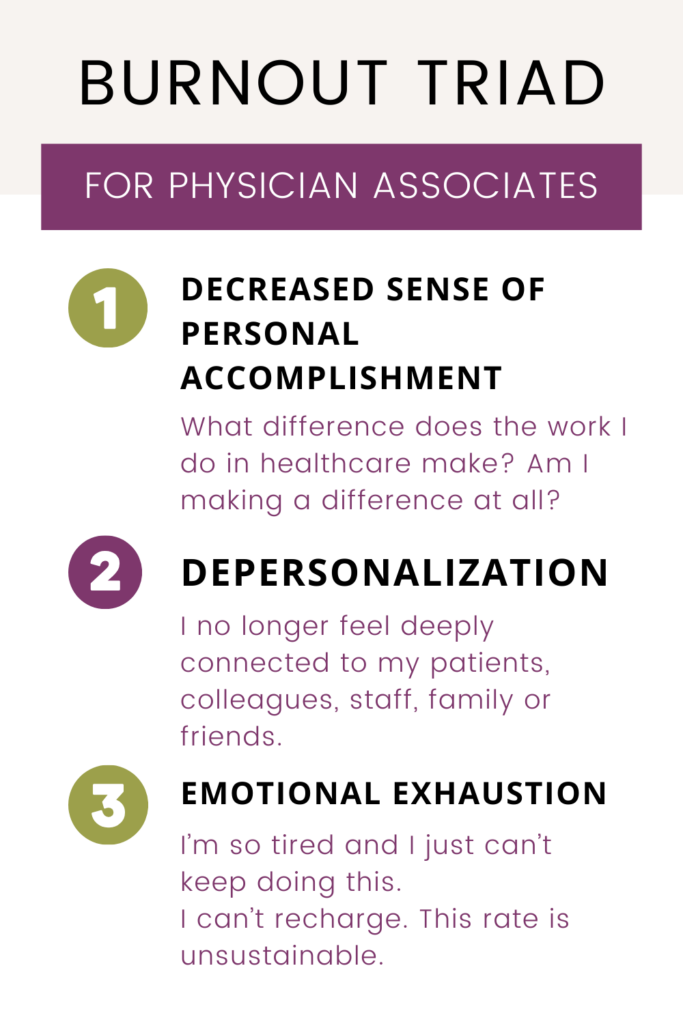
Prevalence of Burnout
Burnout is on the rise and in our post-Covid world, the level of burnout in healthcare is rising and it’s higher now than it’s ever been before. The current prevalence of burnout in physicians is over 60%.
In fact, physicians as compared to non-medical rates of burnout results in a 1.5 to 2.5 times higher rate of burnout than their colleagues working outside of medicine.
Interestingly in non-medical fields, the longer you went to school, the higher the level of your degree, the less likely you are to burnout. In medicine, the opposite is true. In medicine, the longer you went to school and the higher level your degree, the higher your risk for burnout. This means that the more responsibility you have in medicine, the more other people’s lives are on the line and sitting in your hands, the more likely you are to burnout.
Risk Factors for Burnout
Just like the diseases that we treat as physician associates in clinic, there are specific risk factors for burnout.
Risk factors for burnout include (but are not specifically limited to) being female, of younger age, having higher student loan balances, young children at home and being in partnership with someone who is not a healthcare worker. In this instance, your biggest supporter might not “get it” when you need to decompress of debrief after a day at work.
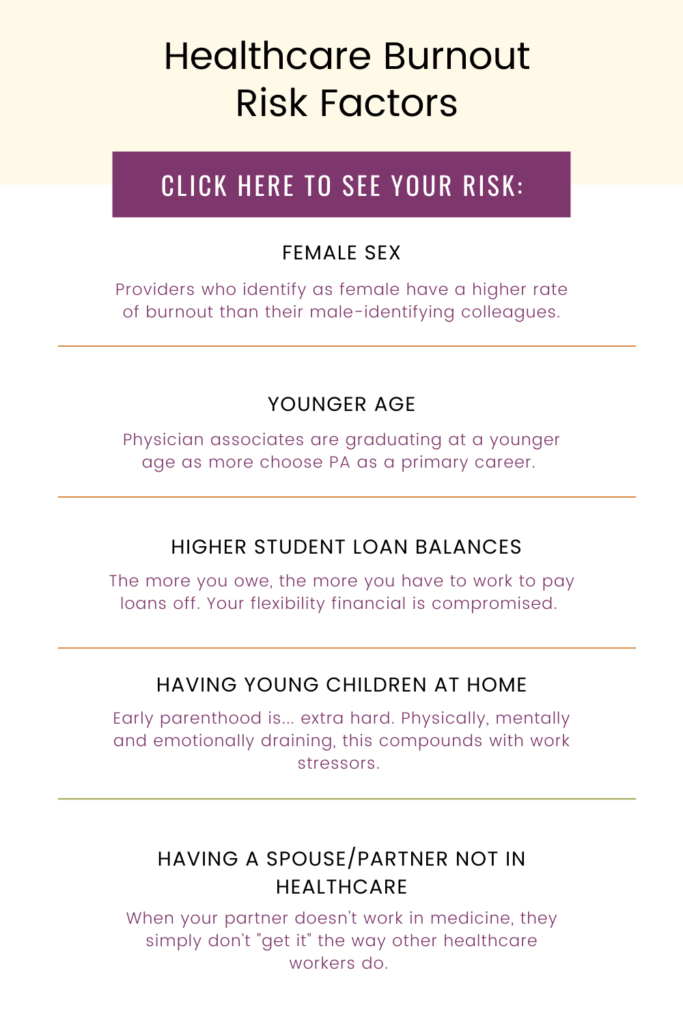
The Cure for Burnout
We must fix both the system and help the people who are currently burned out after having suffered at the hands of that.
Systemic fixes can help to improve culture and prevent future burnout, but it’s the current healthcare workers living in burnout that need help.
The cure for burnout is not one-size-fits-all – there is no one single therapy, practice, or intervention that will work to prevent burnout in every single individual affected by healthcare burnout.
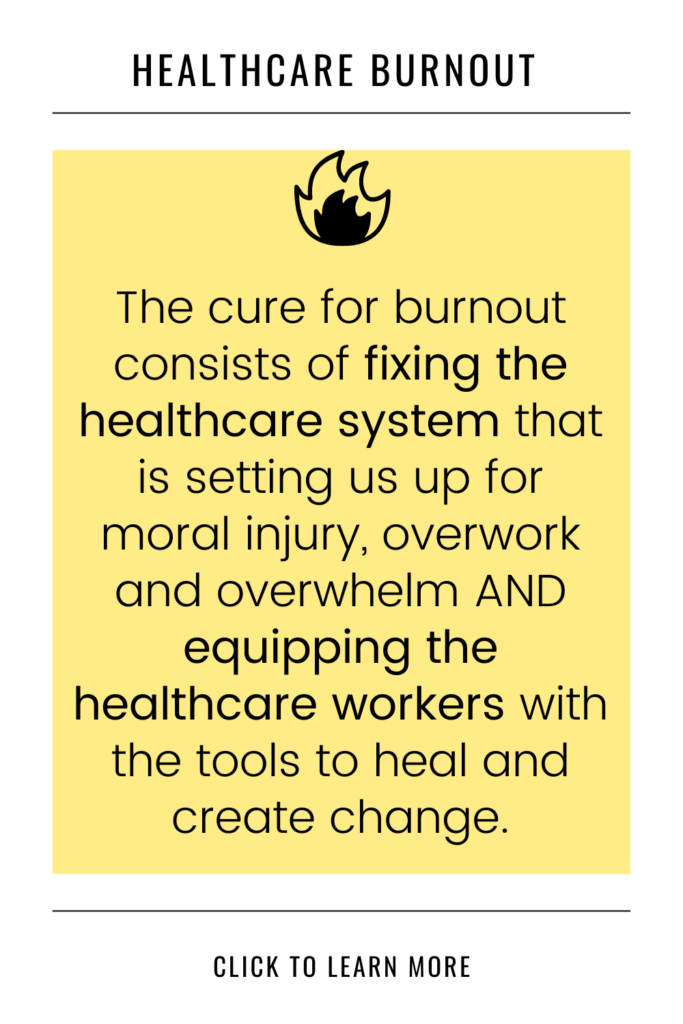
How to Recover from Burnout
Individually you’re going to need to dive into the source, to identify why and how it happened.
The two key pieces of recovering from being burned out are going to be self-care (making sure your own basic needs are being met first and foremost) and intentionally creating clear, enforceable healthy boundaries (that don’t leave you feeling guilty).
Self-Care Strategies
Meeting your own basic needs, specifically making sure you are eating healthy foods that feel good and fuel your body, getting enough sleep, and moving your body in a way that feels good and brings you joy – those are the basics.
Breathing! You’re going to be breathing all day, anyway. Bringing your attention to your breath, taking deep, cleansing breaths, box breathing, releasing tension and set intention meditation will serve you well in this space.
A set intention, release tension strategy to harness your energy can be found here. Check out this technique of box breathing.
Your Schedule: Create white space for margin in your life. Prioritize things that bring you joy and that are just for you on your calendar. Build in time for that sleep, thos healthy meals and that movement that your body and mind so desperately crave.
Value-Based Living: Identify your core values – use this free guide for my 3-step process to do just that – and start to live in alignment with those values. Find areas that don’t matter to you and invest less time and energy in those areas. Find ares that matter to you and stop neglecting them!
Gratitude: Cultivate a gratitude practice that works for you and reminds you of the incredible things that you have to be grateful for. I shared all about my gratitude practice in this post here.
Time, Money, & Energy: You are in charge of how you spend your time, your money, and what you spend your energy doing, focusing on (and sometimes worrying about). Create systems for budgeting your time, your money and your energy.
Be diligent about creating margin in your life. Create a plan for debt reduction, building financial margin, and focusing on the improvements in the choices you have.
Get Support: From your primary and specialty care providers. From joining a support group. From connecting with your colleagues. Consider seeing a therapist for counseling and support! Make sure you are getting your preventative health screenings, testing, and taking care of yourself.
Find Meaning: Refocus to uncover or rediscover your passion. Read Unicorn Space by Eve Rodsky for an important reminder of why hobbies and protected time to pursue them are vital.
Make Time for Fun: Schedule in (and look for opportunities) for pursing FUN and laughter in your life. Take your PTO – your paid time off if your job saying “We are going to pay you to NOT coming in.” Leaving your PTO on the table, rolling it over again and again and never using it, is you saying in response “No, I’m good, I’ll work instead of taking a day off.”
Boundaries and Burnout
Boundaries are rare, but they are also incredibly sexy! Having healthy boundaries is the preventative medicine or an antidote to burnout.
It’s certainly easier to start with boundaries that are clear and healthy than it is to build them after the fact. But never fear – if your boundaries suck it’s not too late to build some that rock.
On Recovering from Burnout
It’s not selfish to focus on yourself and your own recovery during this time. Improving your happiness, avoiding or recovering and focusing on your own well-being will benefit those around you. By doing so you are setting an example to those around you – you’re encouraging them to do the same thing in their own lives.
Have you ever felt that sense of emotional exhaustion, depersonalization and like you work and work but nothing ever changes within medicine? Listen to this episode for the 411 on healthcare burnout. You’ll walk away knowing that you aren’t alone, you can make small and big changes to decrease burnout in your life and work. Change is possible and it starts with you.
Don’t miss our latest episodes of The PA Is In on iTunes, YouTube and on The Money PA Blog.
And be sure to subscribe to The PA Insider Newsletter on LinkedIn to be kept up-to-date on all that’s happening with the #physicianassistant (now #physicianassociate) profession.
Ready to take the next step in your journey to sustainability and a paycheck you are proud of as a PA?
Don’t miss the opportunity to book a no-commitment, free consultation with Tracy and her team. We’re here to guide and support you from burnout to balance, from feeling under appreciated to be fairly compensated, creating a plan to cultivate sustainability for your career.
Schedule a Negotiation Consultation today for effortless negotiations and to earn a paycheck you’re proud of.
Pin for Later
